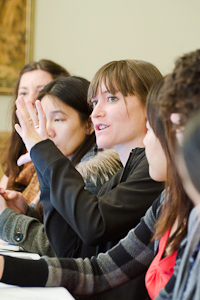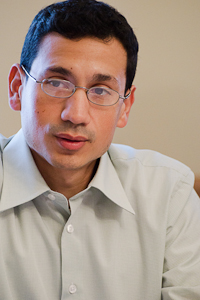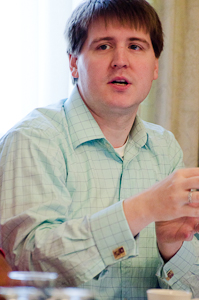The Faculty rides for justice; doctoral students find guidance and humour at the annual DCL retreat; Benoit Girardin travels to Moscow for an international sports law conference
Christie Community Bike Ride
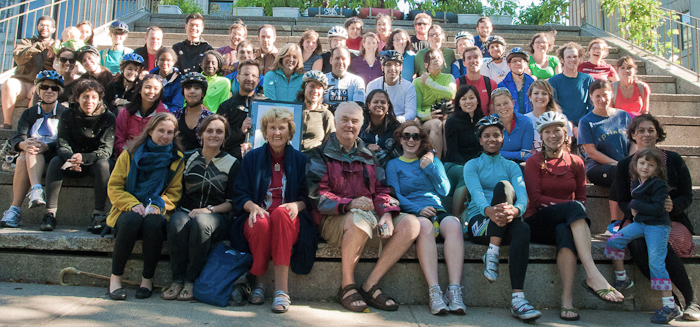
On Saturday, September 10, 2011, fifty riders set off from McGill’s lower campus as part of the annual Christie Community Bike Ride. This year’s 50 km Ride raised over $7500 for the Mile End Legal Clinic. This third annual Ride reinforced what is now becoming a tradition at the Faculty: an event that starts off the academic year with a focus on social justice and community.
The Christie Bike Ride was started in 2009 in order to fundraise for and promote awareness of access to justice issues. The Ride also aims to bring together new and returning law students, professors and staff at the both Faculty of Law and other departments, as well as participants from the broader community. This year, riders rode either a 50 km route to the north shore of Laval, or a 70 km route to the McGill Outdoors Club Cabin where they spent the night. The Ride opened with inspirational words by Janet Christie-Seely (Dugald Christie’s sister and McGill graduate), Dean Daniel Jutras, Professor Alana Klein and Geeta Narang (Mile End Legal Clinic).
The Christie Bike Ride honours Dugald Christie, a B.C. lawyer and activist who offered legal services to low-income individuals and set up several pro-bono clinics across western Canada. He charged extremely low fees and challenged the courts on legal aid regulations that impaired access to legal representation. Tragically, while riding across Canada to raise awareness about the inadequacies of legal assistance programs in 2006, Christie was struck and killed by a van. This year, it was particularly meaningful to have Janet Christie-Seely share with us stories of Dugald Christie’s determination, strength, and creativity in working for justice.
A very big thank you goes out to all participants and donors! This year, the Christie Bike Ride was supported by the Mary H. Brown Fund, the SSMU Campus Life Fund, and the Law Students’ Association.
– Adela Maciejewski Scheer and Corri Longridge (L3)
Doctoral students annual retreat
|
|
|
|
As a student pursuing a doctoral degree in law (D.C.L.), how does one best explain one’s research when talking to a stranger at a cocktail party?
It’s a conundrum common to the graduate student experience across the board – a question enhanced by the particular circumstances of being a student when many of one’s peers work in corporate or office environments.
But the conundrum is especially pointed for those who have chosen to pursue law, noted Isabelle Deschamps.
“Most people sound confused when I say that I’m doing a doctorate in law,” she said, adding that their confusion is often followed by a question: “But, aren’t you already a lawyer?”
The challenge of explaining complex research topics to the average person, as well the psychological and social effects of being a graduate student, fueled keen discussion from the dozen doctoral students gathered at the Faculty Club for the annual DCL Retreat in early October.
“Don’t be afraid of the blank stare” – a piece of advice referring specially to the silence that often follows the statement that one is studying legal history, or administrative law – elicited laughs of recognition everyone in the room.
“We have the chance to pursue our curiosity as our jobs, and I think we are a bit too apologetic about it,” exclaimed Francis Lord. “I don’t think we are excited enough when we talk about our studies to others.”
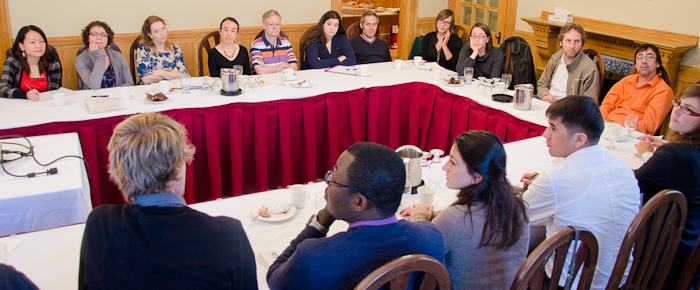
Besides providing the Faculty’s doctoral students with a day to share their experiences with one another, the retreat also featured a full day of talks devoted to areas of professional and personal development in the doctoral program.
Professors spoke to the students about using statistical data in their research and writing and about alternative approaches to legal scholarship. A representative from the McGill-Queen’s University Press joined two other professors to speak about how to turn a doctoral dissertation into a book.
The retreat, organized by DCL students Enrique Boone Barrera and Charles Paul Hoffman, kicked off with a welcome reception the evening before the retreat itself, providing students with plenty of opportunities to practice their skills of self-introduction.
“One thing I’ve found very helpful is to try to explain my research in one page, in one paragraph and in one sentence,” said Jocelyn Stacey at the retreat the following day. To more laughter, a fellow student added: “The one sentence summary is especially useful at weddings and at family events.”
A report on the International Association of Sport Law Conference by Me. Benoit Girardin
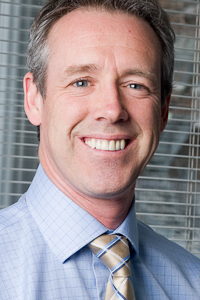
It is with great pride that I represented McGill University, the Canadian Olympic Committee, the province of Québec and our country, Canada, at the International Association of Sport Law (IASL) conference in Moscow at the end of September. Canada has become and is recognized as a leader in international sports law and in international sports.
The conference gathered sports law experts from all parts of the world. Sports lawyers, law professors, researchers, and authors from Russia, Europe, Australia, South Africa, USA, Asia, South America, and Canada met in Moscow to discuss legal issues within the Olympic Movement, the international regulation of sport, legal issues in hosting international sporting events, sponsorships and broadcasting contractual issues, risk management, doping, European sports law, and criminal and corruption issues in sports.
I was invited to join the Board of Directors of the IASL and conference attendees also discussed a draft of a new international sport Charter, which was adopted in principle.
I delivered two lectures at the conference. The first addressed the interference of national judicial courts in the Olympic Movement and the organisation of the Olympic Games, as illustrated by the case of Sagen vs. the VANOC (the Vancouver Organizing Committee for the Olympic Games).
The second lecture presented and discussed the legal issues pertaining to the bidding and hosting of international sporting events during which examples of legal issues were presented and discussed with the delegates. National and international public and private law issues were discussed with a focus on international sports law deriving from the Court of Arbitration (CAS) jurisprudence and other sports arbitration institutions.
The 2012 edition of the conference will be held next June in Beijing, site of the 2008 Summer Olympic Games.
Benoit Girardin is President of LBB Consultants, a Canadian firm specializing in sports law representing professional and amateur sport organizations and members, and international event organizers. He teaches sports law and international sports law at McGill University and is a member of the Canadian Olympic Committee.
Benoit Girardin (450) 979-2230 benoit@lbbconsultants.com

